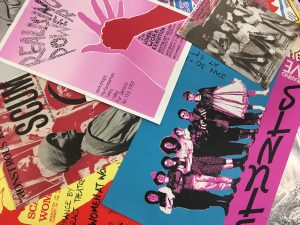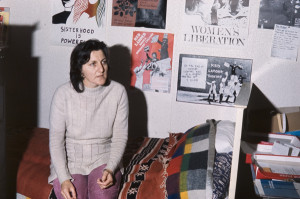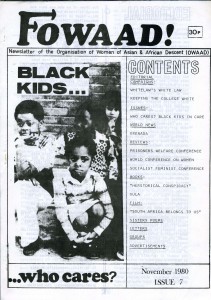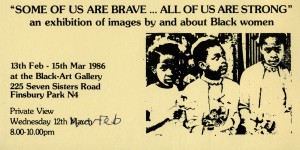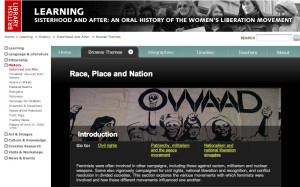If you have encountered link rot on the internet, where links break or click through to the ‘file not found page,’ you will know how vulnerable web-based archives can be.
So when conducting research about Sheba Feminist Press, who published the important Black British feminist text Charting the Journey in 1988 and many others, it was a relief to find some information about them.
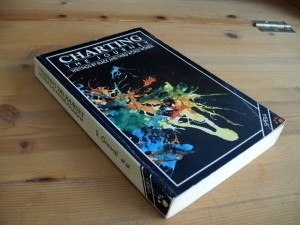
What was slightly disconcerting was the nature of the web page, which appeared graphically old and was hosted by a US university site. It wasn’t being actively maintained and was the kind of link, you suspect, that would soon disappear.
In short, this is the rationale for reproducing the text below in its entirety from that web page in case it breaks, or vanishes.
For further information, the Women’s Library in London was donated records from Sheba Press (1980-1994) in 1995, but it remains uncatalogued and unaccessible to researchers.
Now there’s a funding bid that needs to happen!
ABOUT SHEBA FEMINIST PRESS
Sheba Feminist Press was established in 1980 — one of a handful of small independent publishers born of the UK women’s movement during the 70s and early 80s. The new feminist presses turned their backs on the high-modernist clique then firmly in control of the British book scene, and looked instead at what that world literally couldn’t see: the writing of women who hadn’t been to Oxford or Cambridge, and who weren’t necessarily white or heterosexual or middle-class, and who didn’t speak with the polished vowels of Bloomsbury. The new writers weren’t seduced by the pastoral English idyll of haywains and cottages and
servile, cap-doffing peasantry. They wrote instead about what it was like to live as an ordinary, non-privileged woman in post-imperial Britain in the second half of the twentieth century. The ordinary, non-privileged women who constituted a large part of the book-buying public found their own lives reflected in
these books, and responded with what can only be called devotion. The phenomenal success of women’s publishing was probably the single biggest factor in the dissemination of feminist ideas to
women in the UK.
Today, mainstream UK publishing has been persuaded of the marketability of women writers. Many large publishers have their “women’s studies” lists, and women novelists (some of them) get
reviewed on the literary pages, just like men. But old predilections die hard — particularly, in Britain, the predilections associated with intellectual and social snobbery: if more women writers are published now than in 1965, it remains true that the majority are white, heterosexual, and middle-class.
Sheba has a mission to challenge this persistent bias. We give priority to the work of women writers who continue to be marginalized. That means more than simply being ready to publish writing by women of colour, or lesbians, or working-class women; it means recognising the multiplicity of voices within these
communities — a multiplicity which is frequently overlooked by a world quick to categorize and dismiss. Sheba has built its reputation around its commitment to diversity, to difference, and to open and critical debate. One of our earliest titles was Feminist Fables — a retelling of myths, from a lesbian-feminist
viewpoint, by an Indian woman, Suniti Namjoshi. Published in 1981, when lesbian-feminists were universally assumed to be white, and Indian women universally assumed to be heterosexual, Feminist Fables called into question this cosy compartmentalization; it can be seen in retrospect as a harbinger of the coming
struggles over difference and diversity, which by the end of the decade had put paid to the myth of a unitary feminist identity.
This commitment to openness and to diversity has made Sheba a key player in the ongoing feminist debates around sexuality. In the Seventies and the early Eighties, many women had a new and pleasurable sense of ownership over their bodies and their sexuality; and this was reflected in the books being published.
For Ourselves (Anja Meulenbelt, 1981) was characteristic: written by a woman, for women to read, it rejected the marriage-guidance approach which had previously dominated the field (“Doctor, my
wife is frigid. Can you help me?”) and acknowledged women’s sexuality as a private source of pleasure and power available to all women. Joanni Blank’s The Playbook for Kids About Sex (first published in the US by Down There Press) adopted a similarly positive attitude; children were encouraged to explore their bodies and to experiment with masturbation, fantasy, and sexual play. These and other Sheba titles contributed to the growing acceptance of women as autonomous sexual agents, rather than eternal objects, and helped to undermine the cultural prescription of what Adrienne Rich described as “compulsory heterosexuality”.
As the old prescriptions crumbled, however, new ones sprang up to replace them. The ideological association of sexuality with patriarchal power, expressed through pornography and rape, made sex seem synonymous with oppression. For women, desire was taboo all over again. In 1988, Sheba challenged this new puritanism by bringing out the UK edition of Joan Nestle’s A Restricted Country (first published in the US by Firebrand). The publication of this collection of essays and stories about lesbian sexuality acted as a catalyst on the simmering dissensions over lesbian sado-masochism, butch-femme relationships, and perverse sexuality, and gave the UK proponents of sexual autonomy an important cultural reference point.
The following year, Sheba built on the success of A Restricted Country, by bringing out Serious Pleasure, a collection of lesbian erotica . Although the controversy over pornography and censorship continues, it is clear from the popularity of Serious Pleasure and its successor, More Serious Pleasure that there is a strong and growing demand from many UK lesbians for well-written, explicit, woman-centred erotic material. (N.B. Serious Pleasure and More Serious Pleasure are published in the US by Cleis Press.)
Today, Sheba continues to prioritize the work of women of colour and lesbians. A number of prominent Black U.S. writers have been published in the UK by Sheba, among them bell hooks, Audre Lorde, and Jewelle Gomez. Sheba is now turning its attention to the exciting possibilities opened up by new technology, particularly multimedia and computer-mediated communications. We welcome the
new ease with which we can communicate with other women in countries all over the world; Sheba’s dedication to openness, fluidity, and the absence of boundaries finds a natural home on
the Internet.
Whatever the medium, the message remains the same: feminism, diversity, debate. If you would like to know more about Sheba, please write to us at [email protected]. We’d like to hear from you, and we promise to answer all messages. Sheba titles are available in the U.S. from Inland Book Co., and in Australia from Bulldog Books.
Sheba Feminist Press is a not-for-profit workers’ co-operative.
